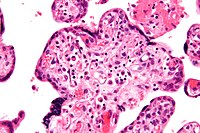
Photo from wikipedia
Aims/hypothesisWe aimed to investigate the impact of maternal gestational weight gain (GWG) during dietary treatment on fetal growth in pregnancies complicated by gestational diabetes (GDM).MethodsThis was a retrospective cohort study… Click to show full abstract
Aims/hypothesisWe aimed to investigate the impact of maternal gestational weight gain (GWG) during dietary treatment on fetal growth in pregnancies complicated by gestational diabetes (GDM).MethodsThis was a retrospective cohort study of 382 women consecutively diagnosed with GDM before 34 weeks’ gestation with live singleton births in our centre (Center for Pregnant Women with Diabetes, Rigshospitalet, Copenhagen, Denmark) between 2011 and 2017. The women were stratified into three groups according to restricted (53%), appropriate (16%) and excessive (31%) weekly GWG during dietary treatment (using the Institute of Medicine guidelines) to estimate compliance with an energy-restricted ‘diabetes diet’ (6000 kJ/day [1434 kcal/day], with approximately 50% of energy intake coming from carbohydrates with a low glycaemic index, and a carbohydrate intake of 175 g/day). Insulin therapy was initiated if necessary, according to local clinical guidelines.ResultsGlucose tolerance, HbA1c, weekly GWG before dietary treatment (difference between weight at GDM diagnosis and pre-pregnancy weight, divided by the number of weeks) and SD score for fetal abdominal circumference were comparable across the three groups at diagnosis of GDM at 276 ± 51 weeks (gestation time is given as weeksdays). The women were followed for 100 ± 51 weeks, during which 54% received supplementary insulin therapy and the average (mean) GWG during dietary treatment was 0 kg, 3 kg and 5 kg in the three groups, respectively. Excessive weekly GWG during dietary treatment, reflecting poor dietary adherence was associated with increasing HbA1c (p = 0.014) from diagnosis of GDM to late pregnancy and infants with a birthweight-SD score of 0.59 ± 1.6. In contrast, restricted weekly GWG during dietary treatment, reflecting strict dietary adherence, was associated with decreasing HbA1c (p = 0.001) from diagnosis of GDM to late pregnancy and infants with a birthweight-SD score of 0.15 ± 1.1, without increased prevalence of infants born small for gestational age. Excessive GWG during dietary treatment and late-pregnancy HbA1c were identified as potentially modifiable clinical predictors of infant birthweight-SD score (p = 0.02 for both variables) after correction for confounders.Conclusions/interpretationRestricted GWG during dietary treatment was associated with healthier fetal growth in women with GDM. GWG during dietary treatment and late-pregnancy HbA1c were identified as potentially modifiable clinical predictors of infant birthweight-SD score.
Journal Title: Diabetologia
Year Published: 2018
Link to full text (if available)
Share on Social Media: Sign Up to like & get
recommendations!